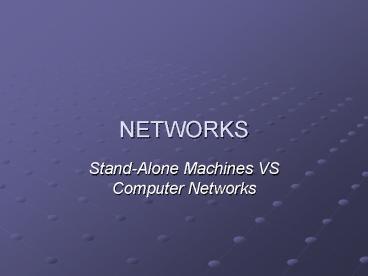NETWORKS PowerPoint PPT Presentation
1 / 15
Title: NETWORKS
1
NETWORKS
- Stand-Alone Machines VS Computer Networks
2
Learning Objectives
- Define stand-alone machines.
- Define workstations / terminals and servers.
- List the advantages and disadvantages of
stand-alone machines and computer networks.
3
Stand-alone machines
- A computer
- cannot communicate with and is not connected to
other computers. - with all devices connected directly to it.
4
Disadvantages of stand-alone machines
- Users cannot easily share information
- Every computer needs to be connected to a
printer. - With these problems in mind, it was realised at
an early stage that connecting these computers
together would overcome many of these
disadvantages.
5
Servers and Workstations / Terminals
- Workstations / Terminals
- A computer connected to other computers.
- Servers
- A computer that 'serves and store files for the
workstations. - They are often more powerful than a standard
computer because they need to store a vast amount
of data.
6
Computer Networks
- Advantages
- A user can access their files from any
workstation / terminal. - Files can be shared by users.
- Users can communicate with others on the network.
- Individual workstations do not need a printer,
one high quality printer can now be shared by
everyone, thus cutting costs. - Networks provide security
- A user must have the correct Password and User ID
in order to be able to access the information on
the network.
7
Computer Networks
- Disadvantages
- Networks can be expensive to set up
- They often involve taking up floors and ceilings
to lay hundreds of metres of cables. - The Server needs to be a powerful computer, which
often means that it is expensive. - Networks are vulnerable to security problems
- Hackers, disgruntled employees or even
competitors might try to break into the system to
read or damage crucial information. - Much effort is spent preventing unauthorised
access to data and software.
8
Computer Networks
- Disadvantages
- If the main Server breaks down, then the whole
system becomes useless and no-one can carry on
working. - Because networks are often complicated, they need
expensive expert staff to look after them. - As the number of users increase on the network,
the performance of the system can be affected and
things start to slow down.
9
TASK B DOCUMENT PRODUCTION
- Students -- ICT -- IGCSE -- Computer Networks
10
Plenary
- What are stand-alone machines?
- A computer which
- cannot communicate with and is not connected to
other computers. - with all devices connected directly to it.
- What are workstations / terminals and servers?
11
Plenary
- What are workstations / terminals and servers?
- Workstations / Terminals
- A computer connected to other computers.
- Servers
- A computer that 'serves and store files for the
workstations. - They are often more powerful than a standard
computer because they need to store a vast amount
of data.
12
Plenary
- What are the advantages and disadvantages of
stand-alone machines and computer networks?
13
Computer Networks
- Advantages
- A user can access their files from any
workstation / terminal. - Files can be shared by users.
- Users can communicate with others on the network.
- Individual workstations do not need a printer,
one high quality printer can now be shared by
everyone, thus cutting costs. - Networks provide security
- A user must have the correct Password and User ID
in order to be able to access the information on
the network.
14
Computer Networks
- Disadvantages
- Networks can be expensive to set up
- They often involve taking up floors and ceilings
to lay hundreds of metres of cables. - The Server needs to be a powerful computer, which
often means that it is expensive. - Networks are vulnerable to security problems
- Hackers, disgruntled employees or even
competitors might try to break into the system to
read or damage crucial information. - Much effort is spent preventing unauthorised
access to data and software.
15
Computer Networks
- Disadvantages
- If the main Server breaks down, then the whole
system becomes useless and no-one can carry on
working. - Because networks are often complicated, they need
expensive expert staff to look after them. - As the number of users increase on the network,
the performance of the system can be affected and
things start to slow down.

